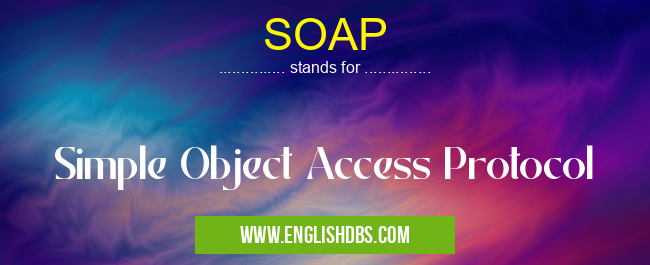What does SOAP mean in CYBER & SECURITY
Simple Object Access Protocol (SOAP) is a messaging protocol designed for exchanging data in distributed systems and web services. It provides a way for applications to communicate with each other over the internet, regardless of language or platform. SOAP is based on XML, which means it can be used with any programming language or platform that supports XML. SOAP messages are sent over HTTP, which makes it easy to use over the web.

SOAP meaning in Cyber & Security in Computing
SOAP mostly used in an acronym Cyber & Security in Category Computing that means Simple Object Access Protocol
Shorthand: SOAP,
Full Form: Simple Object Access Protocol
For more information of "Simple Object Access Protocol", see the section below.
Definition
SOAP stands for Simple Object Access Protocol and is an open-standard protocol designed for securely exchanging structured information between two systems on the internet. It consists of an envelope containing an optional header section, including authentication and security data; a mandatory body section containing one or more parameters; and an optional fault element with error information. With SOAP, applications can send requests and receive responses from remote services using common protocols like HTTP or HTTPS. This makes it possible to access data from different applications and systems without needing to understand the underlying technology they are built on.
Uses
SOAP is mostly used in Application Integration scenarios such as Web Services Development, Cloud Computing and Service Oriented Architecture (SOA). It enables distributed computing in which two or more machines communicate with each other by exchanging messages according to pre-defined rules. In distributed computing environment, SOAP provides a secure way of transmitting application data across heterogeneous systems and platforms while ensuring message integrity. It can also be used for Enterprise Application Integration (EAI), as well as inter-organizational application integration through various intermediaries such as anonymous Internet proxy servers or firewalls. Additionally, SOAP can be used for Remote Procedure Calls (RPCs), allowing programs running on different computers to execute code remotely.
Advantages
The main advantages of using SOAP include better security than other protocols such as RESTful APIs; compatibility with diverse systems; support for streaming; efficient transmission of large amounts of data that would otherwise take too much time when transmitted through traditional protocols; standardized approach that does not require developers to learn new languages or technologies; separation of concerns between clients and servers; and built-in support for document formats like HTML, JSON, etc. Other benefits include standardization across multiple platforms, compatibility with various programming languages, shorter development times due to readily available frameworks that use SOAP technology, support for asynchronous communication over web services, scalability through cluster computing environments such as grid computing and cloud computing.
Disadvantages
Despite its many advantages in terms of speed and flexibility compared to traditional methods of transferring data across networks like FTP or SFTP (Secure File Transfer Protocol); there are some drawbacks associated with the use of SOAP such as complexity in debugging since messages have no structure at their highest level making it difficult to identify errors immediately without specialized tools; limited support for binary attachments resulting in higher costs when transferring large documents between systems; slower performance than alternative REST APIs due to more complicated message encoding/decoding process needed before sending/receiving messages over the network; non portability across different operating systems since implementations need customizing depending on the OS being used
Essential Questions and Answers on Simple Object Access Protocol in "COMPUTING»SECURITY"
What is SOAP?
SOAP (Simple Object Access Protocol) is a messaging protocol used to send structured information over the internet. It is based on XML and provides services through the use of web standards like HTTP, FTP, etc. It is used to facilitate communication between two different applications or systems.
What are the benefits of using SOAP?
Using SOAP can provide a number of benefits, such as secure communication between different applications, flexibility in communication due to its platform-independent nature, and support for multiple programming platforms and languages. Additionally, it helps ensure reliable messaging as it incorporates error handling and versioning.
How does SOAP work?
SOAP follows a request-response model, wherein a request is sent from the client to the server with a specific format (XML), containing an operation to be performed and other data that may be necessary for that operation. The server then provides a response with appropriate status code, which could denote success or failure of the requested operation.
Is SOAP still used today?
Yes, despite newer technologies such as REST, SOAP remains popular as an integration protocol between applications since it offers features that cannot be found in standard web protocols such as persistent connections and reliable messaging.
Is there any alternative to SOAP?
Yes, one possible alternative is Representational State Transfer (REST). As opposed to SOAP’s tight coupling of requests and responses, REST uses stateless connections meaning that each request contains all data necessary to complete itself.
What are some disadvantages of using SOAP?
Some drawbacks include its complexity and verbosity; SOAP messages require more bandwidth due to their larger size compared to other techniques such as JSON or query strings sent over HTTP/HTTPS POST requests. Furthermore, due to its language dependent nature it presents difficulties when accessing remote objects not written in the same language as the calling application.
Can I use both types of API together - Restful APIs and Soap APIs?
Yes you can use both RESTful API's along with Soap API's but they should serve different purposes in order for them to work together without any conflicts. Restful API's are best suited for operations which involve retrieving data from databases while Soap API's are mainly used for complex business logic operations which require authentication & authorization procedures on each request & response cycle thus making them more secure than Restful ones.
SOAP also stands for: |
|
| All stands for SOAP |
